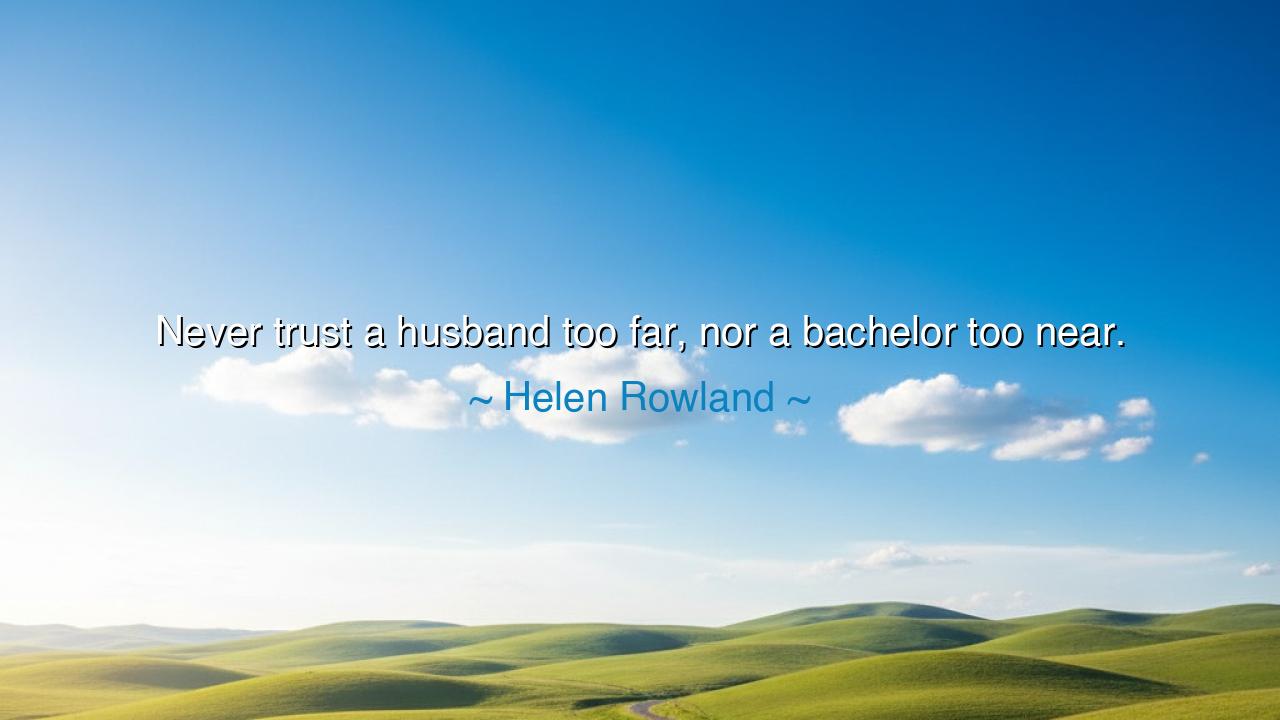
Never trust a husband too far, nor a bachelor too near.






The sharp-tongued wit of the early twentieth century, Helen Rowland, once gave the world a jewel of humor edged with truth: “Never trust a husband too far, nor a bachelor too near.” Though playful, her words speak with the cadence of wisdom passed down through ages, for in them lies an observation about the fragility of human desire, the paradox of relationships, and the delicate balance between intimacy and distance. What seems a jest at first glance is in truth a warning wrapped in laughter, a reminder that both familiarity and temptation must be handled with care.
To say “never trust a husband too far” is to admit the imperfection of men once bound by vows. A husband, though pledged, is still human—subject to weakness, forgetfulness, and wandering eyes. To trust him “too far” is to imagine him invulnerable to these frailties, to place him on a pedestal that no mortal can occupy. Rowland’s wit cuts here: she is not condemning marriage, but reminding us that commitment requires vigilance, that love is not maintained by blind faith but by continual tending, honesty, and the awareness of human limits.
To say “nor a bachelor too near” is to caution against proximity to unbound freedom. The bachelor, unshackled by vows, untempered by duty, may carry a charm that is dangerous if brought too close. His freedom makes him bold, his independence makes him alluring, and yet such closeness can tempt or unsettle what is already established. The warning is clear: guard the sanctity of bonds by respecting the space around them. Where the bachelor is too near, the roots of temptation may creep silently into the garden of trust.
History offers mirrors to this truth. Consider the tragic tale of King David and Bathsheba. David, though a husband, failed when he trusted himself “too far,” thinking his power would shield him from the consequence of desire. The betrayal brought ruin upon his house. On the other hand, many noble households in ancient courts fell not by the failings of husbands, but by the whisperings of charming courtiers or wandering bachelors who came “too near” and unsettled the order of marriage. In both cases, the wisdom of Rowland’s words shines: vigilance is required in both distance and closeness.
The deeper meaning of the quote lies in its recognition of the duality of human weakness. Fidelity is not automatic; it requires humility and boundaries. A husband must guard himself from pride in believing he cannot fail, and a wife must guard herself from over-trusting what is still flesh and blood. Likewise, bachelors and outsiders must be respected for what they are: free agents, whose nearness may carry risk. This is not cynicism but realism, a recognition that love is maintained by awareness as much as affection.
The lesson for us, children of tomorrow, is this: love thrives in honesty, vigilance, and balance. Do not place blind trust where human frailty resides, nor place reckless closeness where temptation waits. Build marriages and partnerships on truth, humility, and mutual accountability. Know the limits of human weakness, and strengthen the walls of fidelity not with suspicion, but with wisdom and respect for boundaries.
Practical wisdom must follow. When you love, nurture that love daily; do not take it for granted. When you trust, trust wisely, not blindly. And when you keep company, be mindful of the spaces between friendship, intimacy, and temptation. In this balance lies not only the protection of love but its flourishing.
Thus, remember Helen Rowland’s timeless wit: never trust a husband too far, nor a bachelor too near. For hidden in this jest is an eternal truth—that love must be guarded not with chains of suspicion, but with the wisdom to know where boundaries lie, and the courage to honor them. In this vigilance, love endures, and in its endurance, joy remains unbroken.






DCPhung Duy Cuong
It’s such a short but layered statement. On the surface, it’s funny, but there’s also a certain world-weariness behind it. It suggests that love, no matter the form, requires vigilance. I can’t help but ask — is that a healthy mindset, or does it reflect a lack of faith in others? Maybe Rowland wasn’t advocating suspicion, but rather encouraging women to stay sharp and independent in a world that often underestimated them.
GDGold D.dragon
This line feels like classic early 20th-century wit — sharp, teasing, and maybe a little jaded. It makes me wonder how much of it was meant as satire versus genuine advice. Is the humor masking a deeper truth about human behavior and temptation? Perhaps Rowland was highlighting how trust in relationships must be balanced with self-awareness, because people, married or not, are still flawed and unpredictable.
TNLe thi nhan
I find this quote clever but a bit cynical. It seems to imply that neither the security of marriage nor the excitement of singlehood can be trusted entirely. Is Rowland warning against naivety in romantic relationships, or just using humor to express the inconsistencies of men? Either way, it captures that timeless tension between desire and caution — the idea that intimacy always comes with a hint of danger.
HTMy Ha Tran
This quote makes me laugh but also raises an eyebrow. It’s clearly witty, but underneath the humor, there’s an interesting commentary on trust and relationships. I wonder if Rowland was poking fun at gender roles of her time or making a serious point about human nature. Is she suggesting that both commitment and freedom come with their own risks? Maybe it’s less about distrust and more about keeping realistic expectations in love.